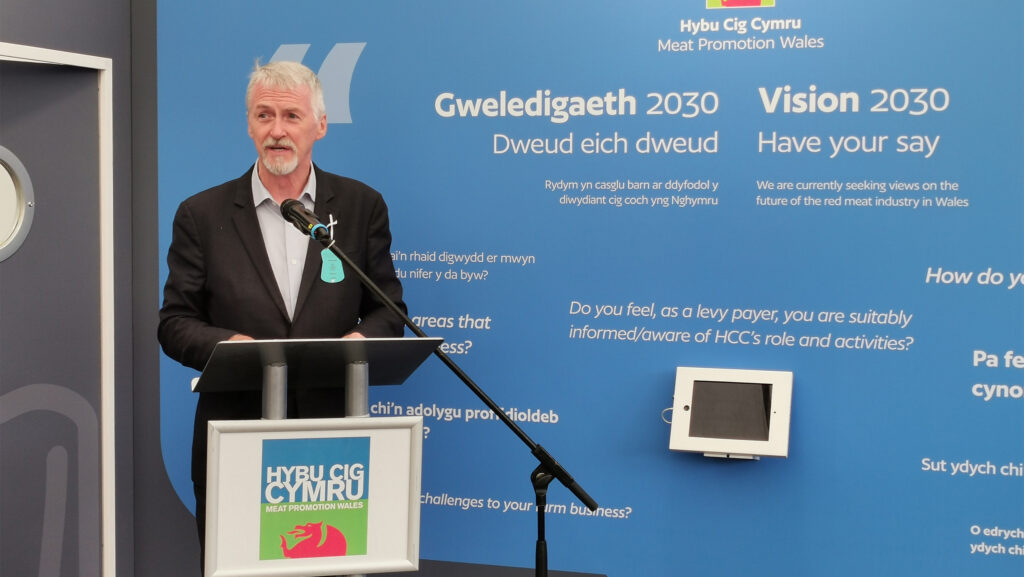Industry must back bluetongue vaccine, says Welsh minister
 Huw Irranca Davies at the Royal Welsh Show © MAG/Phil Case
Huw Irranca Davies at the Royal Welsh Show © MAG/Phil Case Welsh rural affairs minister, Huw Irranca-Davies, has urged the farming industry to unite on the national vaccination drive against Bluetongue virus (BTV-3), warning that time is running out to prevent the disease from spreading into Wales.
Speaking at Hybu Cig Cymru’s breakfast briefing at the Royal Welsh Show on Monday, the minister emphasised the need for a proactive, united approach to vaccination as cases begin to emerge in neighbouring England.
“Bluetongue is potentially devastating,” said Mr Irranca-Davies.
“We’re buying time for livestock keepers to vaccinate their animals, to get ahead of the disease.
See also: Wales eases bluetongue rules for English slaughter lambs
“The primary purpose of vaccination is to protect animal health and welfare – not just to facilitate trade.”
His comments come just 10 days after the first cases of the BTV-3 strain this season were confirmed in England, including in Oxfordshire and Herefordshire.
With higher livestock densities in Wales, the risk of a serious outbreak is increasing.
While the minister stressed that there is “unanimous support” for vaccination across the industry, concerns are mounting over the cost of the Boehringer Voltavo-3 vaccine – priced at £2.50/dose – especially among sheep farmers with large flocks.
Vaccine costs unsupported
A spokesperson for the Farmers’ Union of Wales (FUW) said: “For cattle, vaccination acts like a passport.
“It enables movement and creates a clear incentive for beef and dairy farmers to vaccinate.
“But for sheep farmers, it’s a different story. Their animals are generally less valuable, so the cost of vaccination becomes a much heavier financial burden.
“Aligning sheep movement rules with those for vaccinated cattle would provide a stronger incentive for the sheep sector to get on board.”
Phil Stocker, chief executive of the National Sheep Association (NSA), said his organisation backs Welsh ministers’ calls for more farmers to take up BTV-3 vaccination.
He recommended farmers start with a conversation with their vets to understand the risks and benefits that vaccination brings.
“Cost is always going to be a consideration, but you don’t need to have many losses and disposal costs to make vaccination look good value,” he added.
BMPA view
Nick Allen, chief executive of the British Meat Processors Association (BMPA), supported the Welsh government’s aim, but warned of mounting logistical and financial pressures.
“We respect the desire to keep the disease out of Wales,” said Mr Allen.
“But farmers are effectively cut off from livestock supply in England and Scotland. There’s real disruption and extra cost.”
He also called for stronger government backing towards vaccination costs.
“Everyone needs to get their heads around the fact that vaccination is the only way we’ll stop this,” he said.
“We did it in 2007, with vaccination and government support. At the moment, there’s precious little support – just a message to vaccinate.”
But on vaccine pricing, Mr Allen was blunt. “£2.50 pales into insignificance when your livestock is worth £2,500. The risk of doing nothing is far greater,” he warned.
Red markets
The Welsh government has introduced Bluetongue-approved red markets to ease slaughterhouse access from restricted zones, and pledged to keep policies under regular review.
“We’ll keep listening,” said Mr Irranca-Davies. “This is a dynamic disease, and we’re trying to keep it out of Wales for as long as we possibly can.”
